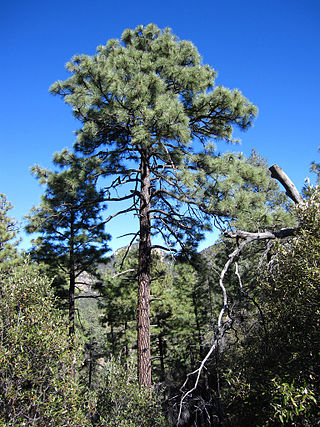
Pinus engelmannii, commonly known as the Apache pine, is a tree of Northern Mexico, in the Sierra Madre Occidental with its range extending a short distance into the United States in southwestern New Mexico and southeastern Arizona. This pine is a medium-sized species with a height of 20–30 metres and a trunk diameter of 35–80 centimetres.

Picea engelmannii, with the common names Engelmann spruce, white spruce, mountain spruce, and silver spruce, is a species of spruce native to western North America. It is mostly a high-elevation mountain tree but also appears in watered canyons.

White spruce is a common name for several species of spruce (Picea) and may refer to:

Quercus engelmannii, the Engelmann oak or Pasadena oak, is a species of oak in the white oak section, native to southern California and northwestern Baja California, Mexico.
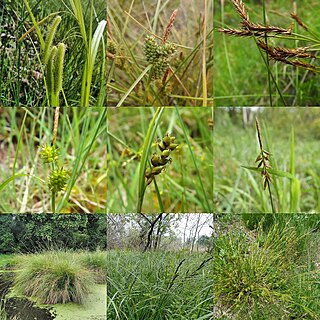
Carex is a vast genus of nearly 2,000 species of grass-like plants in the family Cyperaceae, commonly known as sedges. Other members of the family Cyperaceae are also called sedges, however those of genus Carex may be called true sedges, and it is the most species-rich genus in the family. The study of Carex is known as caricology.

Echinocereus engelmannii, the strawberry hedgehog cactus or Engelmann's hedgehog cactus, is a cactus commonly found in desert areas of the southwestern United States and the adjacent areas of Mexico, including the states of California, Nevada, Utah, Arizona, Baja California and Sonora.

Opuntia engelmannii is a prickly pear common across the south-central and Southwestern United States and northern Mexico. It goes by a variety of common names, including desert prickly pear, discus prickly pear, Engelmann's prickly pear in the US, and nopal, abrojo, joconostle, and vela de coyote in Mexico.

Isoetes engelmannii is a species of aquatic plant in the family Isoetaceae. It is referred to by the common names Engelmann's quillwort or Appalachian quillwort, and is the most widely distributed species of its genus in eastern North America. Its range extends from Ontario in the north, south to Florida and west Arkansas and Missouri. It can be found from April to October in temporary pools, bogs, marshes, stream edges, swamps and along wet roadsides.
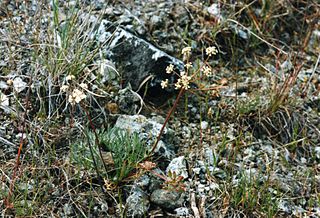
Lomatium engelmannii is an uncommon species of flowering plant in the carrot family known by the common name Engelmann's desertparsley, or Engelmann's lomatium. It is native to the Klamath Mountains of southern Oregon and northern California, where it is a member of the local serpentine soils flora.

Carex riparia, the greater pond sedge, is a species of sedge found across Europe and Asia. It grows in a variety of wet habitats, and can be a dominant species in some swamps. It is Britain's largest Carex, growing up to 130 cm tall, with glaucous leaves up to 160 cm long. It hybridises with a number of other Carex species, including the closely related Carex acutiformis – the lesser pond sedge. A variegated cultivar is grown as an ornamental grass.

Cypripedium passerinum is a species of lady's slipper orchid known by the common names sparrow's-egg lady's-slipper, spotted lady's-slipper, and Franklin's lady's-slipper.
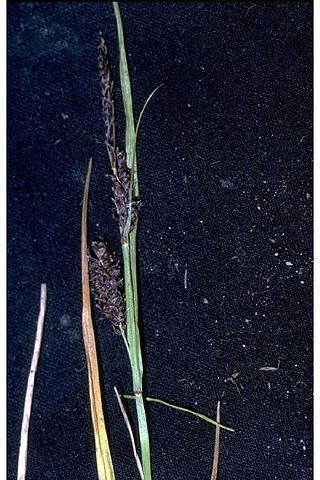
Carex saxatilis is a species of sedge known by the common names rock sedge and russet sedge.

Halophila engelmannii is a species of seagrass in the Hydrocharitaceae family. It is referred to by the common names star grass and Engelmann's seagrass and grows underwater on shallow sandy or muddy sea floors. It is native to the Bahamas, the Cayman Islands, Costa Rica, Cuba, the Gulf Coast of the United States, the Gulf Coast of Mexico, Puerto Rico, and Trinidad and Tobago.
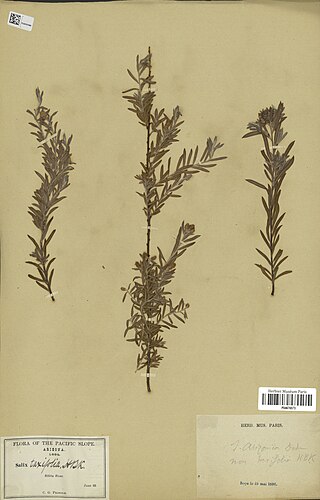
Salix arizonica is a species of willow known by the common name Arizona willow. It is native to the southwestern United States, where it occurs in Arizona, Colorado, New Mexico, and Utah.

Carex sect. Ovales is a section of the genus Carex, containing around 85 species of sedge. It is the most diverse section of the genus in North America, containing 72 species:

Carex subg. Vignea is a subgenus of the sedge genus Carex, containing around 300 of the 2000 species in the genus. Its members are characterised by having bisexual, sessile spikes, where the female flowers have two stigmas each.
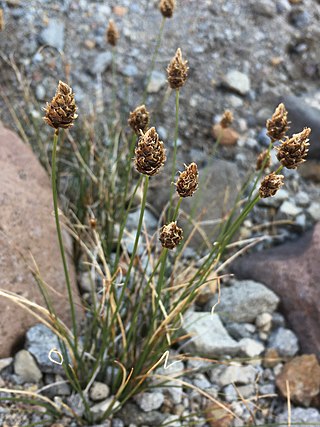
Carex breweri, known as Brewer's sedge, is a species of sedge that grows on dry rocky or gravel slopes in the Sierra Nevada and Cascade Mountains of the western United States, as far north as Mount Hood. It is classified in Carex sect. Inflatae, alongside Carex engelmannii and Carex subnigricans.
















